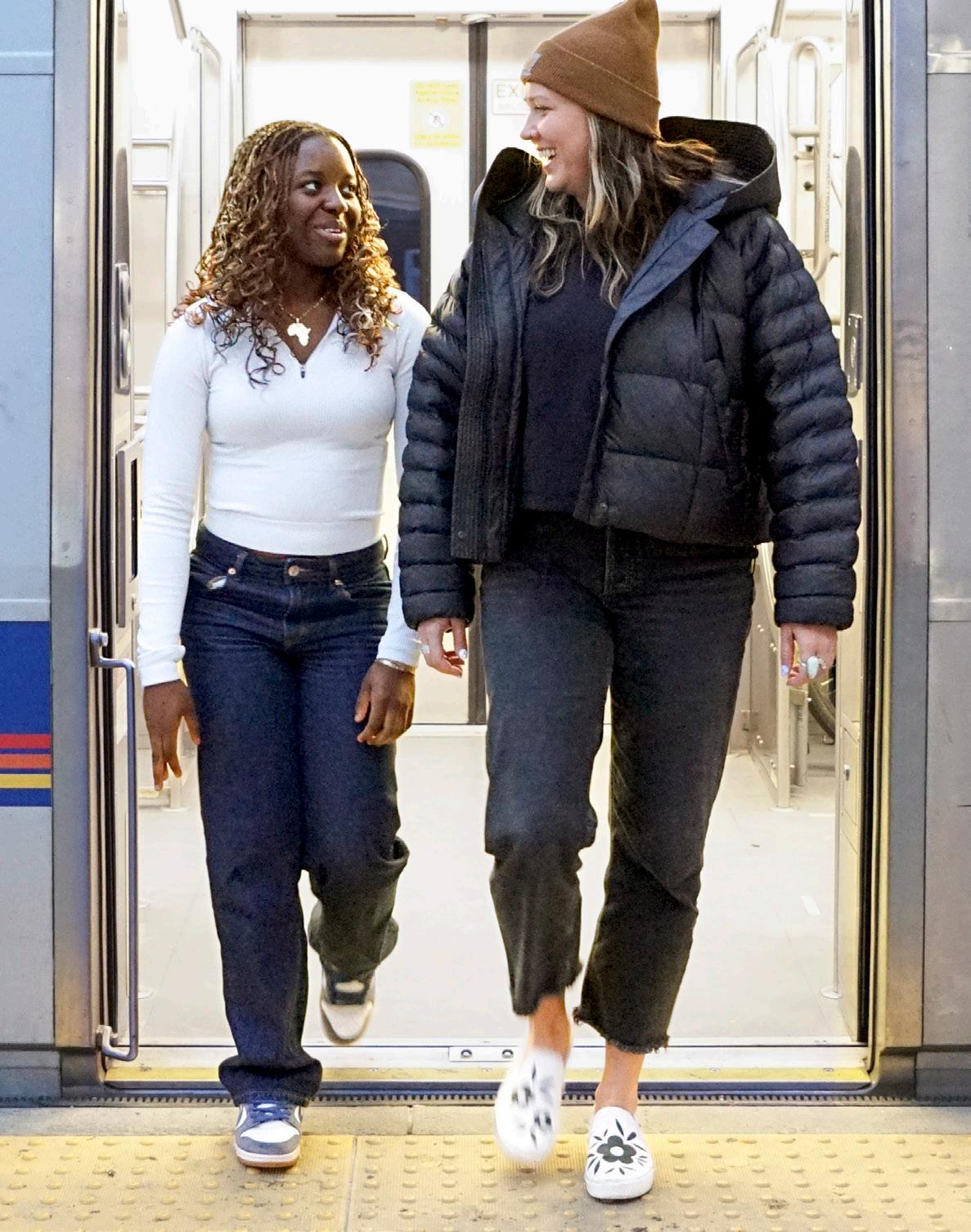


























































Introducing adolescents to Jesus Christ and helping them grow in their faith.

A YEAR OF EXPLORING

“TASTE
— PSALM 34:8 (NIV)
Our God is a God of invitation. He is warm, gracious, and receptive to those who want to know him. In fact, Jesus continually encourages the curious to “come,” “come and see,” and “come follow me.” The Lord loves when we inquire of him and his truth because it demonstrates we are genuinely seeking.
The year 2024 has been marked by exploration. It rises out of our KNOWN movement, where we know Jesus, know kids, and make Jesus known. This, of course, is nothing new in the mission of Young Life.
• For the last 80+ years Young Life staff and volunteers, both individually and corporately, have explored the Savior and his words. We want to be women and men marked by our desire to go deeper in our walk with him. As the disciple Peter wisely pointed out, he alone has “the words of eternal life” (John 6:68).
• We have also endeavored to know kids better. Generation Z, comprised of adolescents aged 13 to 24, is a unique group, and one which we’ve spent a great deal of 2024 learning about through The RELATE Project. You can read all about how we relate to the needs of Gen Zers in the following pages.
• We encourage kids to come and see what all the excitement is about when it comes to Jesus. We want them to know he welcomes all questions, and those who ask them. In fact, he seems to love explorers!
In the last section of our report — Our Proclamation — we address how we’ve been exploring a different way of framing the gospel. Not to worry, we’re not changing the message of the good news itself, just articulating it in a way that helps this generation better understand the grand narrative, the overarching story of the Savior and his love.
It is this story which we find ourselves overwhelmed by, and therefore compelled to share with our young friends. Thank you for helping us explore alongside this generation “how wide and long and high and deep is the love of Christ, and to know this love that surpasses knowledge — that you may be filled to the measure of all the fullness of God” (Ephesians 3:18b-19).
Here’s to many more years of exploring the One worthy of all our seeking!
In Christ,
Newt Crenshaw President/CEO
Harold D. Melton — Chair
Partner
Troutman Pepper Atlanta, GA
Mark Rodriguez — Vice Chair
Owner, The Growers Company, Inc.
Owner, R&S Mexican Food Products Yuma, AZ
Nanette Ballbach Retired Employment Counselor Philadelphia, PA
Sue Beré
Retired Family Therapist Neenah, WI
Newt Crenshaw
President and CEO
Young Life Colorado Springs, CO
Doug Eaton
Owner/Operator
NuVinAir West and Southwest Paradise Valley, AZ
L. Brooks Entwistle
Managing Director and GM Ripple Singapore
Heriberto “Berto” Guerra Jr. Chair and CEO
Avanzar Interior Technologies San Antonio, TX
Raquel Harrison
Emergency and Lifestyle Medicine Physician New Canaan, CT
Bill Haslam Former Governor State of Tennessee Knoxville, TN
Jacqueline Holland
Assistant Director of Children’s Education Lantern Community Services New York, NY
John Hummel President
AIS Capital Management, L.P. Naples, FL
Susan Hutchison Chair Emeritus Washington State Republican Party Seattle, WA
Reginald “Regg” L. Jones III
Founder and Managing Partner Greenbriar Equity Group LLC Riverside, CT
Clyde Lear Retired — Founder Learfield Communications, Inc. Jefferson City, MO
Kevin McVaney Medical Director Denver Emergency Medical Response System Denver, CO
Curtis B. McWilliams Chair
Ardmore Shipping Corporation Winter Park, FL
Mike Murray Principal Murray Bertron Tampa, FL
Susan Peterson
Owner, Cabell’s Designs Owner, Relish Atlanta, GA
Chris Roberts
Executive Vice President and General Manager, Global Food and Beverage Ecolab, Inc. Minneapolis, MN
Michael Stain
SVP Regional Manager Citizens Business Bank Fresno, CA
Kathy Stevens Owner
Opex Corporation Dallas, TX
Thomas L. Thomas Retired CEO
CSI Division
Thomson Reuters Tax and Accounting Group Ann Arbor, MI
Phyllis J. Washington Chair
Dennis and Phyllis Washington Foundation Missoula, MT
Angeline Yee Former Attorney Hong Kong
Kristin Young
Bible Teacher, Social Worker, and Author San Jose, CA
Mark Zoradi
Board Member and Retired CEO
Cinemark Theaters Burbank, CA



With 60% of Africa’s population under the age of 25, it's the youngest continent in the world based upon population age. God has been moving in this concentration of young people, especially through courageous African leaders, resulting in rapid growth in Young Life — so much so that our work in Africa represents over half the teens in the mission of Young Life.
With this momentum, God has raised up more leaders who have said yes to his call. We’re excited and grateful to announce seven newly appointed vice presidents across our three African divisions. Join us in celebrating the following vice president promotions:
God is moving in the hearts of our staff and building them up for his glory in ways we could never imagine.

Sthandazile (Stha) Moyo South-West Geography
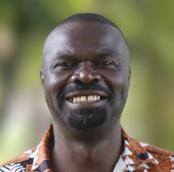
Richard Odongo Victoria Geography


Deborah Samaké Franco-Phone Geography

Sharon Intauno South-East Geography

Fireselam (Frey) Assefa Ethiopian Geography
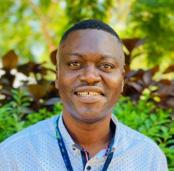
Zinnah Yallah Coastal Geography
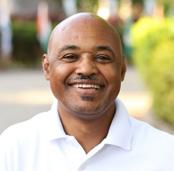
Moges Berasa Horn of Africa Geography

In 1984, Sergio and Roselie Murru started Jeunesse et Vie, Young Life’s ministry in Belgium! This year they celebrated 40 years of ministry, along with 250 alumni, former kids, leaders, board members, and Western Europe staff.
In Bulgaria, a former communist country in Eastern Europe, volunteerism is uncommon. However, Young Life Bulgaria held their annual winter camp and three cabins of kids came from a new, volunteer-led area, Blagoevgrad! A third of the 18 volunteers who helped make camp happen came from an area started only this year. Forty-three students heard the gospel — all made possible by Jesus followers who counterculturally give their lives away.
Our new Young Lives Mongolia ministry held their very first camp this summer. In August, 12 young moms and their 14 children attended camp in traditional yurts along the Mongolian countryside. Through the care of our staff and leaders, these young women experienced the love and message of the gospel.
As the new year began, Young Life staff and spouses from all over the globe descended upon Anaheim, California, to gather together for worship, teaching, laughter, and community. The conference is held every four years, but this was the first time in Anaheim. Participants left the time feeling more connected with the mission and with one another, returning home with a renewed energy and vision.
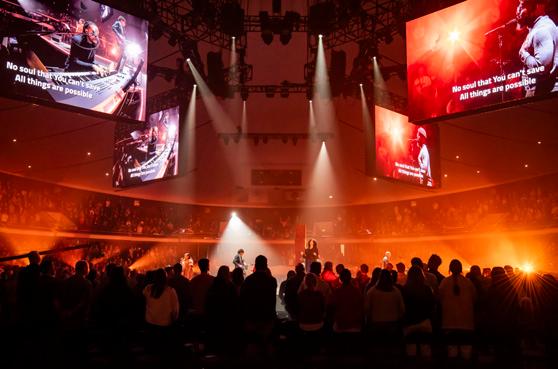





'23 '24 Ministry Year | 2,928,505
'22 '23 | 2,305,114
AVERAGE WEEKLY CLUB ATTENDANCE
'23 '24 Ministry Year | 378,150
'22 '23 | 374,900
AVERAGE WEEKLY CAMPAIGNERS
'23 '24 Ministry Year | 184,190
'22 '23 | 160,377
'23 '24 Ministry Year | 313,022
'22 '23 | 256,200
'23 '24 Ministry Year | 69,043
'22 '23 | 57,026
'23 '24 Ministry Year | 6,212
'22 '23 | 5,859





“EVERYONE HAS THE RIGHT TO KNOW THE TRUTH ABOUT JESUS CHRIST. THEY HAVE A RIGHT TO KNOW WHO HE IS; THEY HAVE A RIGHT TO KNOW WHAT HE’S DONE FOR THEM. FURTHERMORE, THEY HAVE A RIGHT TO MAKE THEIR OWN CHOICE OF HIM … THAT’S NOT JUST WHAT YOUNG LIFE’S ALL ABOUT; THAT’S ALL THAT YOUNG LIFE’S ALL ABOUT — JESUS CHRIST.”
— Jim Rayburn, Young Life Founder



This mission has always been about Christ and kids. We’ve met them where they are and spent time learning what’s on their hearts. From World War II in the early to mid-1940s to the civil rights movement of the 1960s to the technology explosion of the last three decades, we’ve walked alongside teenagers through changing times. Of course, today’s generation has its own unique set of challenges and concerns. (More on that below.)
To better understand Gen Zers we’ve released the results from our first-ever
from the study:
“Like every generation before them, Gen Z is facing the intimidating transition of moving from childhood to adulthood — from dependence to independence. What makes them different from generations before them is doing it in a world that’s overwhelmed by more digital access than their minds can process.”
Into this experience, Young Life leaders enter. Just as we have in our previous eight decades, Young Life walks into the world of kids, ready to care and point them to the Savior.
“LIKE EVERY GENERATION BEFORE THEM, GEN Z IS FACING THE INTIMIDATING TRANSITION OF MOVING FROM CHILDHOOD TO ADULTHOOD — FROM DEPENDENCE TO INDEPENDENCE. WHAT MAKES THEM DIFFERENT FROM GENERATIONS BEFORE THEM IS DOING IT IN A WORLD THAT’S OVERWHELMED BY MORE DIGITAL ACCESS THAN THEIR MINDS CAN PROCESS.”

explorative study on adolescents. We’ve called it The RELATE Project, and we’ve shared the data with many other organizations and media also looking to learn more about Generation Z.
The RELATE Project examined the relationships, attitudes, beliefs, and experiences of adolescents aged 13 through 24. To achieve broad and diverse representation, the 7,261 surveyed reside in five countries and/or regions (Eastern Africa, India, Mexico, the United Kingdom, and the United States).
So what makes this generation both similar to others and unique, as alluded to above? Consider this reflection
We believe we’re uniquely positioned to come alongside them and help them navigate the rough waters of adolescence.
We do this by giving them the gift of exploration. Just as we’ve spent critical time exploring what’s important to them, we invite them to explore what’s of utmost importance to us: Jesus Christ and the abundant life he offers.
On the pages that follow, we share some of the findings from The RELATE Project along with stories that paint the picture of how we’re addressing these needs. May these accounts encourage you as they’ve encouraged us!


In The RELATE Project we learned that a vast majority of teens — seven out of 10 ages 13 to 17 — say they have at least one non-family adult who cares about them. And more than half have an adult confidant — someone they can talk to about matters of significance to them.
But these numbers drop as teens age. By the time young adults reach ages 22 to 24, only 56% say they have a non-family adult they can count on.
This is why we go! We know young people are desperate for contact with adults invested in what’s important to them.
So we take the initiative and go to their games, their practices, their recitals, their hangouts. We explore all they find important, we listen, and they soon understand how much we care. We give them the gift of time.
For one college student this happened over many months and gallons of coffee …




“THEY DON’T KNOW WHAT THEY’RE MISSING”
A student named Andrew reached out to our Young Life College at Boise State University Instagram page with the following message: “Hey! I recently had a crazy dream in which I felt God’s presence, and ever since I’ve been trying to find a church to discover what exactly that was. Where are you located? And is there a priest or somebody like that I would be able to talk with sometime? I don’t know the first thing about religion but feel it’s what my life is lacking.”
We met over coffee and Andrew poured out his life to me. Growing up in an atheistic home, he was discouraged from being involved in any religious activity. Addicted to marijuana and alcohol since 14, he wanted more in life.
Over several months we had many more conversations over coffee. When his spring break plans (partying in Mexico) fell through, he signed up for our Zion National Park spring break trip the day before we left. One particular lie keeping Andrew from Jesus was that “these people don't understand what you've been through or what it's like to have an addiction.” On the second day of our trip Andrew excitedly said he was going on a hike with another student, Shawn, who had been where Andrew
is now. Andrew couldn’t wait to pick his brain.
When they returned from the hike you could see something had drastically changed in Andrew. He’d given his life to Jesus on the top of a mountain and was now living with the Holy Spirit! Forty college students celebrated with him, and all of heaven roared. Andrew couldn’t stop smiling for the rest of the week and repeatedly told me, “I’ve never been able to experience a community of people who build me up instead of tear me down. I’m so full of joy and peace. Everyone should follow Jesus; they don't know what they're missing!” Since then, we've had several amazing conversations, he’s connected with a church, and is praying God will use him to witness to his dad and brother.
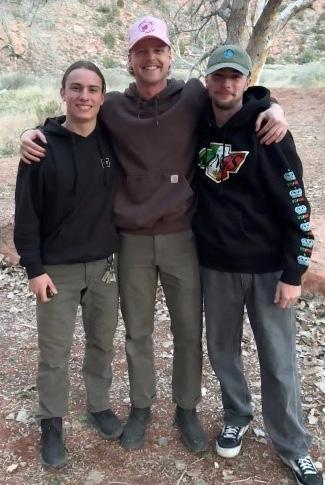
STUART, AND ANDREW
Andrew and Shawn both want to go through leader training and get baptized. Andrew has a hard road of recovery ahead, but now has a community of people supporting him through the power of Jesus.
— Stuart Boyd, staff, Young Life College at Boise State



In our exploration of the stressors of Generation Z, The RELATE Project revealed that young people go through their most vulnerable periods during transition phases. This starts around 16 and continues through many important changes in the late teenage years: greater independence with driving, graduating high school, going to college, starting a job, or getting married. In fact, in the transition years of 16 to 18, almost every marker of flourishing dipped.
During these transitions, Gen Zers can struggle with loneliness and loss of identity. They might grieve what they’ve left behind. The emotional toll can be significant.
We show up for kids in these gaps. Sometimes it’s a volunteer leader helping seniors move from Young Life to Young Life College. Often, it’s a Club Beyond staff person meeting a military teen whose family has just been deployed to a new installation. It may be helping one of our Capernaum students grow into a leadership position.
Or it’s walking alongside a former teen mom, now in her 20s, and showing her we’re still here for her …

For one group of former teen moms (now 20+) in Lewisville-Flower Mound, Texas, the question, “What’s next?” is met with love and encouragement at RISE, a discipleship ministry of Young Lives. The ministry helps young parents establish a strong foundation in Christ, focus on what God calls them into next, and grow into servant leaders.
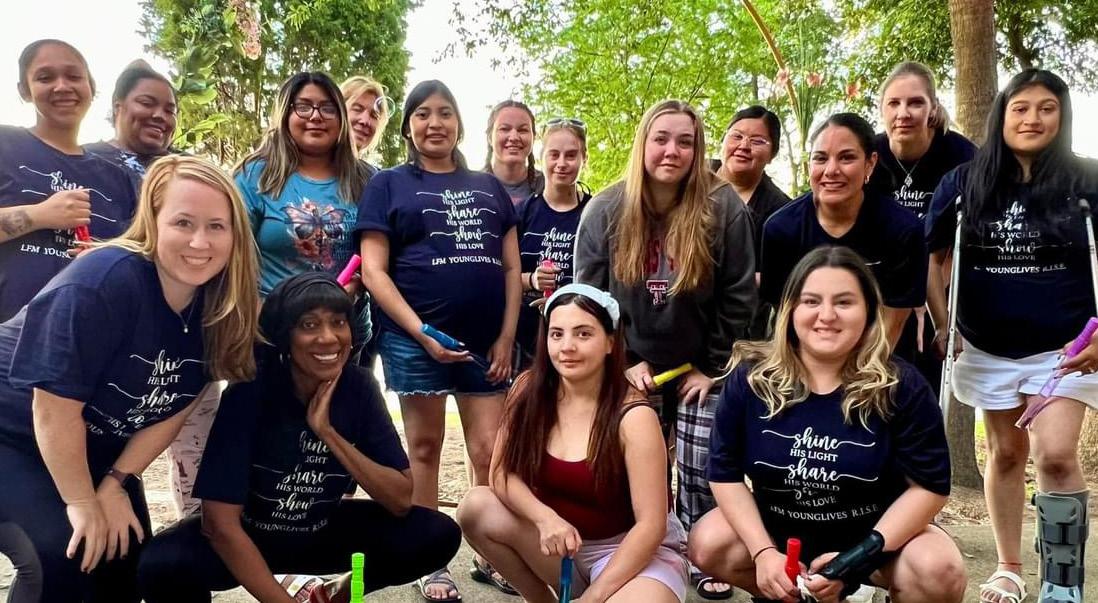
“The RISE retreat was the next step for my walk with God. I’m thankful for my mentors there and the people God put around me to remind me he has a plan for me,” Vanessa, a RISE participant, said. “Like Esther, God has a purpose for me. I may not understand what it is now, but throughout my journey with Christ, he will clarify.”
I’ve been with some of these girls for eight years, and I tear up thinking that some will “graduate out” next month. I’m also excited that some of the girls will return as volunteers next year. I pray all of our friends hear they are so loved, seen, and known by their Creator. That they have a purpose, and God uses all things for good even when we cannot see it at the moment.
— Melissa Gomez, Young Lives, Lewisville-Flower Mound, Texas


We found that how young people see themselves — what we call self-concept — is closely correlated with belonging and close relationships. These essentially move together — as one increases, so does the other. Faith also is related to the triangle of self-concept, belonging, and closer relationships. Faith acts as a framing story for how we live; it offers meaning and understanding.
FLOURISHING
SELF-CONCEPT CLOSE RELATIONSHIPS BELONGING
FAITH
The gospel is not simply a set of truth claims, but a lived reality. The gospel is embodied in a person and incarnated again and again in our staff and volunteers as they invite, build close relationships, and redefine self-concept — all within the framing story of Jesus.
Like Jesus, we want the best for our friends. We know this is found in a relationship with the one who has made them, loves them, pursues them, and desires only the best for them. That’s why we help them explore Jesus and know him better. And by knowing him, they can better know themselves.
Just like Malik …



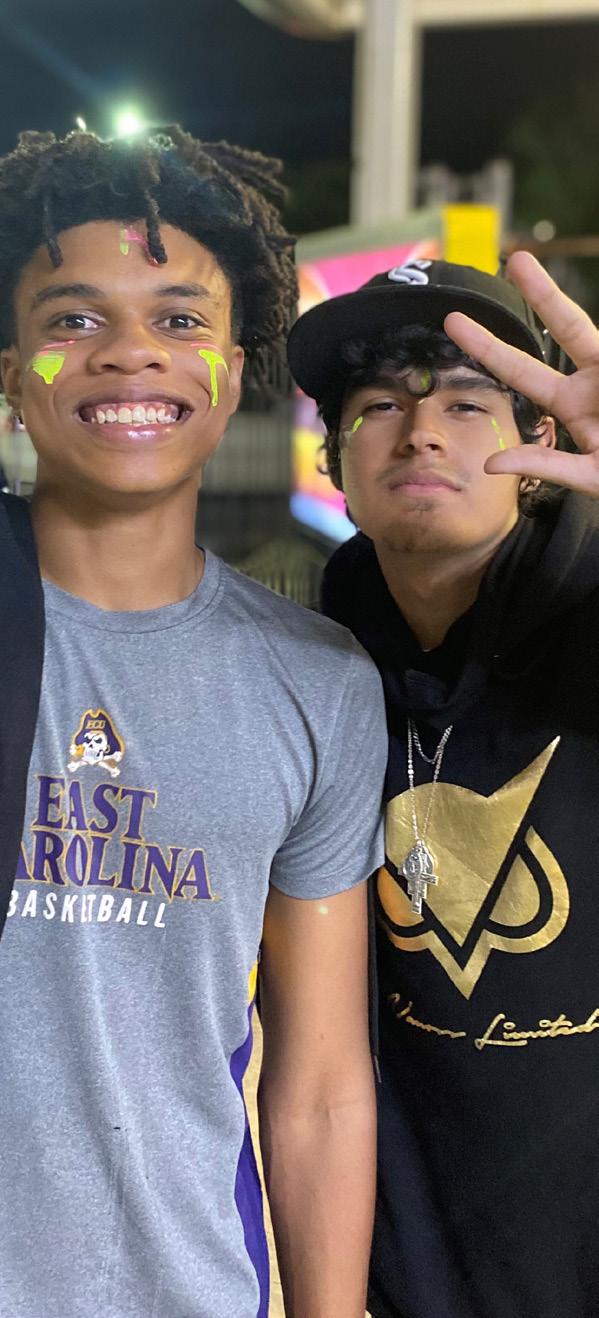
Malik loved his first Young Life club. As I drove him home, he told me it was the best night he'd ever had. “When are we doing it again?” he asked. “Can I get a ride?”
Then he leaned over and whispered, “I have autism. Can I still come to Young Life even though I have autism?” “Absolutely,” I assured him. “We'd love for you to come!”
That was the beginning of our friendship, and since then he’s been all in. Over time I’ve asked Malik questions like, “How do you feel about having autism? What are some things you might need that would be helpful to you? What are some interests and gifts God’s given you?”
He admits he has a hard time making friends and sometimes feels socially awkward with his peers. One of the gifts Malik has, however, is his outgoing nature. He’s sent me the numbers of 50 kids he's invited to Young Life, and about 30 have come to club this year.
AT THE END OF THE CAMP WEEK AT SHARPTOP COVE, HE STOOD UP AT SAY-SO, TO PROCLAIM HE GAVE HIS LIFE TO CHRIST. TODAY, HE’S WALKING WITH THE LORD, COMES WITH US TO CHURCH ALMOST EVERY SUNDAY, AND FEELS LIKE ONE OF THE FAMILY.
Malik is learning about how God has made him. He’s also grasping he's no less a part of God's body because he has autism. We were praying for a way to make club a space of belonging for everyone at Rose High School. And then the Lord introduces us to this wide-eyed 16-year-old with autism. Through Malik, God is impacting the lives of kids for generations. And definitely my life, too.
— Austin Robertshaw, area director, Greenville, North Carolina



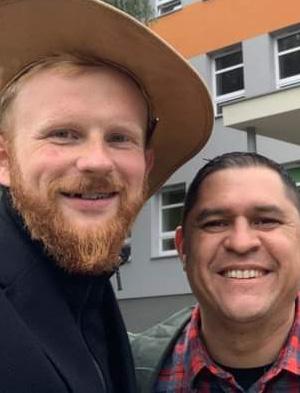


We also discovered Generation Z looks to those in older generations for guidance and direction. The RELATE Project reminded us that young people need older adults who will slow down and listen well, admit they don’t understand everything about being a youth today, seek understanding, and be slow to insert advice. Family, teachers, coaches, faith leaders, and other trusted adults prove to be important confidants they can turn to on important matters.
In Young Life we know we are only one part of the critical network today’s adolescents turn to for support. We love to link arms with other adults who care about kids,
and help our young friends explore relationships with these mentors for even more wisdom and comfort.
We see it firsthand in schools, organizations, and churches around the world. A beautiful picture is rising up, for example, in the Catholic church. We’re excited to work alongside the church in countries as seemingly different as Nicaragua and Poland …
Recently Chico Valdivia, metro director of North Nicaragua, spent three days visiting Dominik Faferek, the country director for Poland, observing his ministry with Catholic kids in Dominik’s hometown of Poznan.

Chico shared his thoughts ... Kids in Nicaragua and Poland face similar challenges. They lack an understanding of their identity. There's a lot of depression and anxiety. Like kids everywhere, they have that same need to be seen, loved, and heard.
I’ve learned a lot from Dominik and how he loves kids. I saw my friend open his home, and when somebody opens their home, they open their heart. I walked in his neighborhood and his schools; I met his leaders, and it impacted me. They’re passionate, going where the kids are, and listening to them; they model it to everybody around them. It comes from their Catholic roots, actually. You see announcements in the parish about Young Life events. They’re obedient. They go and they serve. They’re washing their people's feet.
One of the beautiful things is when people who are already in the church meet Jesus, they stay. Permanencia is the word in Spanish. They've got mentors, community, confession, silence, and an established prayer rhythm. They already have acts of service built in around them. How do you go to the poor, the hospitals, the community? Without Jesus, it doesn't make much sense, but with Jesus, they understand and their faith is strengthened.
The church is providing this huge place where Young Life can do club, and schools, universities, and seminaries are opening up too.
I believe Poland could be key to impacting all of Europe because of their tradition, their connection, their strong base, their testimony. There is such potential there.
Many people from Ukraine escaping the war have gone to Poland. The people of Poland are saying, “These are our neighbors, these are our friends." The Catholic church is opening its doors, providing a roof, a home, a place; it's an amazing model of service. They're evangelizing Ukrainians in the midst of Ukraine's hardest times and that's not going to be forgotten. I think kids fleeing the war will say, “Somebody loved and accepted me in Poland.” And that's Jesus.
It's the same Jesus in every part of the world.


In The RELATE Project, when asked to come up with their own words to describe themselves, the two most common words Gen Zers used were kind and good. We see this in the way they’re speaking up for causes important to them.
Young Life leaders know kids want to live out of their desire for kindness and goodness. The ultimate embodiment of these qualities, of course, is Jesus, who proclaimed he “did not come to be served, but to serve, and to give his life as a ransom for many.”


Our friends also feel compelled to make a difference in the world through service, meeting needs in real and tangible ways.
We provide them with opportunities that help them explore their gifts and abilities to serve. Some will find these on work crew or summer staff at one of our Young Life camps. For others, it’s found in adventure camping service projects. One such program is called Young Life Adventures …

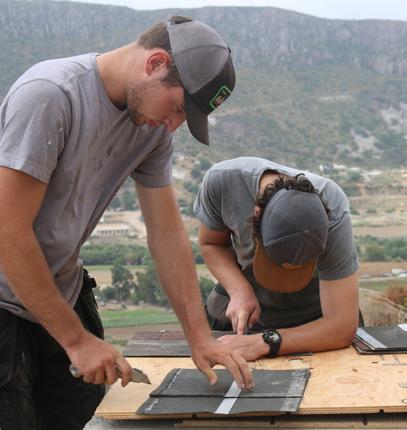
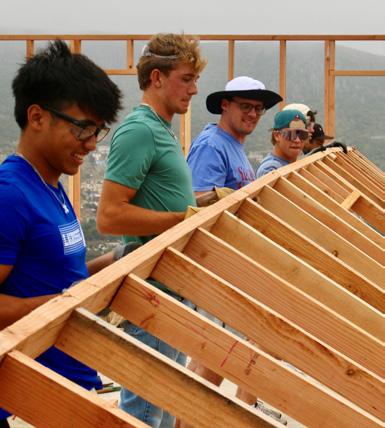
How do we sum up the life-changing, world-expanding month our Young Life Adventures (YLA) campers experienced in Baja, Mexico? Throughout June, campers and leaders built and gifted two houses to two families as a part of this discipleship service camp.
What words best capture the awe of handing over keys to these two families who will see future generations growing up with stability and shelter? And how do we describe the humbling generosity of these families who showed their gratitude by preparing a meal for our Adventures Baja campers?
Over the course of four weeks of camp, YLA participants also cooked and served 1,500 meals at an orphanage, held babies, made crafts, played games, and provided times of joy for children forever living without their family of origin. And at another service project site, we experienced moments of holiness when moving rocks and mixing cement to build walls around a ministry center playground area, so kids like those from the orphanage have a future place to come play and go on retreat. We are so grateful for the varied ways we encountered God through serving others in Baja, and, as a result, return home more aware of his

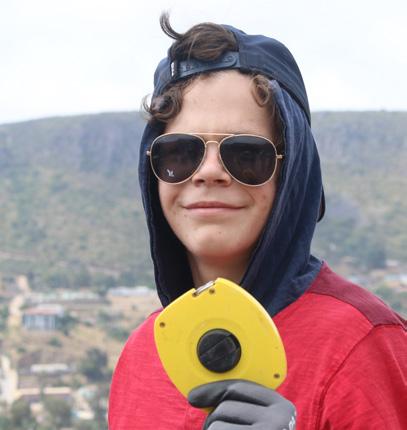
presence in our lives and his purpose for us as a part of his family.
Here's one camper’s response on the experience:
“Highlights of my week were seeing how happy the family was when they saw us building the house because they were so grateful, and playing with kids at the orphanage. This week I experienced God through helping others. It opened up my eyes to really get to know God more.”
— James and Courtney Thomsen, directors, Young Life Adventures
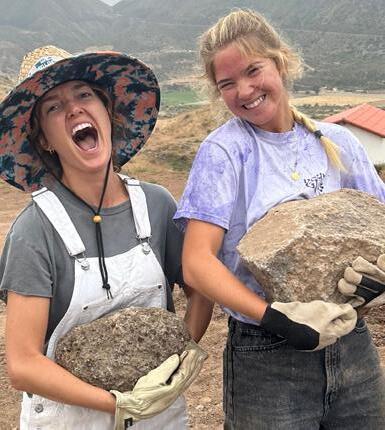


Faith plays a role in how Gen Z thinks about improving the world. We discovered most follow the faith of their families, and more Gen Zers than not believe in a higher power.
And counter to some narratives about adolescents losing their religion, belief actually strengthens with age. So when you see or hear a teen expressing doubt, be patient and give it time. Teens need years of experience and exploration to come to their own conclusions.
We’re here for them in these times of searching. From personal devotional guides to weekly Campaigners Bible studies to small group adventure camping to serving at camps, we offer Gen Zers myriad opportunities to help them grow in their faith. Following Jesus means exploring the deeper truths he invites all of us into daily. This takes time, both individually and in community, but is richly rewarded when kids see the Lord working in and through them.
One special opportunity for this life change can be found in a nearly 50-year-old ministry called Discipleship Focus.


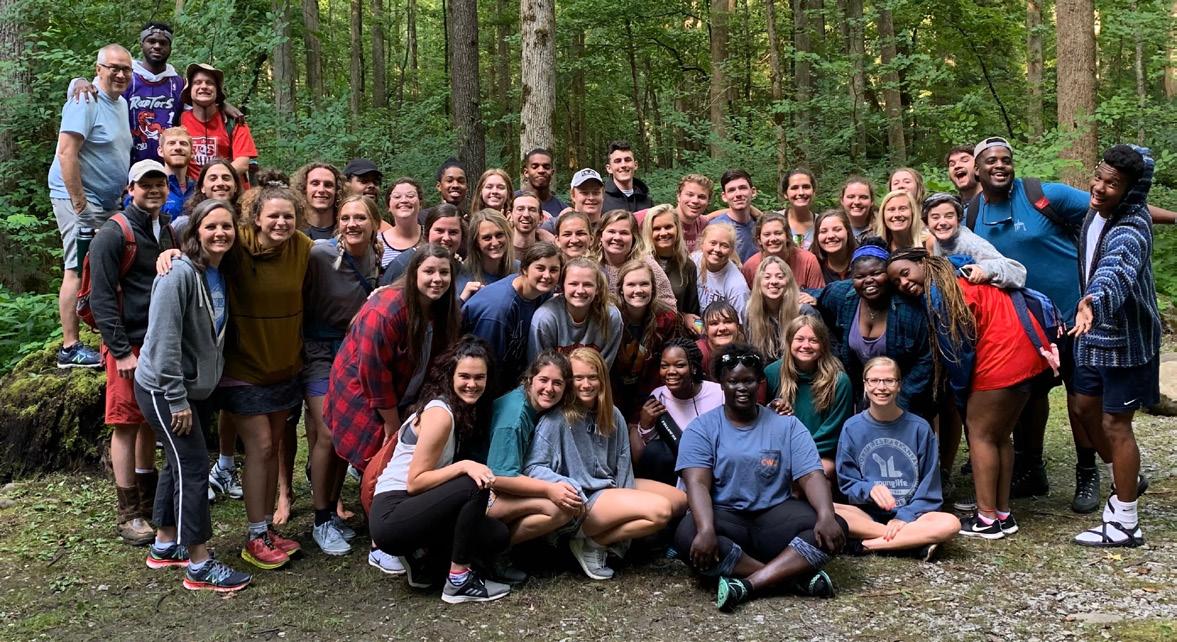
Discipleship Focus (DFO) offers an unforgettable experience for college students to grow deeper in their faith by working at a theme park and living in community. Each summer, 50 college students come together in Pigeon Forge, Tennessee, and Branson, Missouri, where they’re poured into through small group experiences, teaching, service through work, and so much more, so they can return and pour into their Young Life clubs or college campuses. It’s proven to be a summer that reignites faith and reveals new layers of God’s love.
Wil Bragg, 2021 DFO alum, speaks about his summer experience:
“At DFO, I came to a true understanding of who Jesus is, and what that truly means for how I can
confidently approach his throne of grace. My small group leader, Dennis, loved me so well as I was working through this new understanding of who I am. He was patient, gentle, and wise in the ways he spoke and listened.
“Through Scripture study, leadership, the community of believers, and working at Dollywood’s Splash Country, I had a concentrated environment to wrestle with hard questions alongside people asking the same questions! I’m eternally grateful for DFO, and the way the Lord used it to bring me into a deeper, more personal, and intimate relationship with him.”
This experience marked the summer when Jesus’ unconditional love and grace became tangible for Wil. Two years later, it significantly
influenced the trajectory of Wil’s life as he started Young Life in Doddridge County, West Virginia.
“Currently working at an elementary school in a brand-new town, and starting Young Life in the area, I occasionally get so wrapped up in it all that I find myself reverting back to earning God’s favor, fearing he’ll leave me if I fail. When I feel these fears and doubts rising, I look to the fundamental truths in Scripture that Jesus loves me and will never leave me, whether worthy or unworthy, clean or unclean. I cling to Jesus' gracious and faithful heart and remember who I am, a beloved child of the King.”
DFO has been a catalyst that changes the lives of our college kids!


We’re here for all of it — the hard and messy and real that life throws their way.
We don’t claim to have all the answers, but we’ve tasted and seen how the Lord is good. And we know he is the answer. So we point kids to the Savior because we want our friends to know him too.
As we’ve outlined, this generation is in fact facing unprecedented challenges, but they’re longing for life in the midst of it all. Through RELATE we learned they seek affirmation outside of social media. They long for face-to-face communication, not only with their peers, but with trusted adults. This could be their mom, dad, grandma, grandpa, local Young Life leader, pastor, lacrosse coach, or
biology teacher. We affirm them seeking out these voices of experience and wisdom.
We also want to help them achieve the strong hopes and dreams they have for themselves, and the world. They want to be seen as kind and good, another indication that they’re longing for the qualities found in Jesus. Along with kindness and goodness, they’re passionate about truth and justice, standards that Jesus not only affirms, but embodies.
Through time in God’s Word, community, prayer, and service, we offer them opportunities to live out of this goodness and kindness, blessing others in the process.



We love them for who they are, and look forward to discovering with them who they can become. Furthermore, we’re excited to see what they do with their God-given gifts and talents.
Ultimately, we want to connect them with their Father in heaven who loves them and gave his Son for them. He desires for each of these precious kids to know him, and enjoy a future lived fully in his love.
He is the ultimate treasure every explorer seeks.
We believe this generation will find him, and it’s our highest joy and privilege to make the introduction.
Here’s to the next generation!






* Distributed across the 2,400 area ministries and 32 camp properties we own and/or operate worldwide.





Almost every young person we know has a desire to be known, to be seen, to belong with purpose. Whether they can articulate it or not, they know in their bones they want a story that matters ...
How do we invite young people into a bigger and better story? We can break down the essence of the Bible’s grand narrative into four parts.
We believe this can help us communicate to our audience, whether at club, camp, Campaigners, or one-on-one, how their desire for a story that matters fits into God’s grand narrative. We’ve called this the Ought, Is, Can, and Will paradigm (borrowed from founder of The Clapham Institute, Mike Metzger).


In Genesis 1-2 we find a story depicting creation as a cosmic temple where the reigning God would come to rest. God will continue his reign by creating human beings, not for striving and misery but to bear his image. This is a radical story where God places these human beings in his temple, this garden. Their responsibility is to relate to God, self, others, and the world “as co-rulers with God and as mediators of God’s presence in God’s cosmic temple.”
And when they did, they flourished, they knew wholeness and joy. This is because, quite simply, God creates humanity:
• For life and relationship with him.
• To have purposeful relationships with each other. We simply can’t be ourselves by ourselves.
• With capacity, desire, and authority to maintain the flourishing of creation and join in with God in bringing justice and rightness in the world.
This is how it ought to be.
Beneath the surface, every young person is asking profound internal questions: Who am I? What is my purpose? Where do I belong? They long to find answers to these questions so they can live a life, as one person said, “worthy of a best-selling autobiography.”
So when our friends say, “Life is just not the way it’s supposed to be,” they’re actually making a profound theological statement. If creation had no purpose, if humans were not made in God’s image, if the Fall didn’t happen, then things are actually exactly as they ought to be. But kids know that’s not true. They know in their bones they were made for more, not less.
This gives us the theological foundation to agree, “You’re right! Things are not as they ought to be!” Then, it gives us the confidence to describe the truth of what we were actually made for: that identity is found in a relationship with God, who sees, recognizes, and gives the worth one longs for. Purpose is knowing the joy of joining with God as he brings justice and rightness. And belonging is living in a community that gives and shares dignity with one another. In other words, the doctrine of creation allows us to boldly proclaim there is an “ought” and that “ought” is this vision of human flourishing.


The Fall, of course, is where sin enters the story and humans go off the rails, taking God’s place in deciding what is good or wise. In the garden, the serpent tempts humans with the promise of being God-like by “knowing good and evil.” On the surface, that might sound like a good offer. Of course we want this “hidden” knowledge. The problem is we just don’t have the ability to understand, hold, and discern all of this information, nor were we meant to. Whether we believe it or not, judging good and evil is only a cosmic job, one that only the all-knowing God can fulfill.
Nevertheless, we attempt to usurp the King, sit on his throne, and judge the world on our own. The tragic results cannot be overstated.
First and foremost, our relationship with God is severed and our hearts no longer love what God loves. Instead, humans want only what we want and desire. We pin our hopes on created



things to give to us what our loving Creator had already promised us, namely intrinsic worth.
Second, our actions are no longer aligned with God’s wise order for creation. Instead that aim is reduced to a desire for power and force which we use against others and is also used against us.
Third, relationships are no longer driven by love for the good of the other, in generous giving and receiving. Instead, relationships are primarily about taking and keeping, greed and lust. We consume instead of contribute. Aren’t these, essentially, a description of What Is? Couldn’t we take an honest look at our world, even our own actions, and attribute them to one or more of these disordered desires? Theologians rightly describe sin as “rebellion against God,” or even loftier, “cosmic treason against a Holy God.”
We desire things. That’s not bad. But we desire the wrong things, while judging they’re the right


things. The consequences are consistently disastrous. Sin has trapped us, distorting every longing and desire inward upon ourselves. This inward turn of all our desires is unsustainable. We’re continuously being hollowed out and dehumanized, to the point of death. Sin’s persuasive power traps us into believing two things: our strongest desires are our deepest desires (if we feel it strongly, it must be right), and being the judge of the world suits us just fine. We’re duped into believing, to borrow a well-known tagline, we “were made for this …” — if this is truly what we want.
To say “all have sinned and fall short of the glory of God” means we’ve usurped God, grabbed for his glorious role as the gracious, loving judge of the world, and missed the mark of the grand human vocation (What Ought to Be). So badly, in fact, that we’re a mere shell of what we’re meant to be. Even in light of the mess we make, the cosmic rebellion we commit, apparently the desire to be the judge of the world is so strong we wouldn’t give it up for anything.
But, our strongest desires are not necessarily our deepest desires.


It’s fair to say the cross is the most surprising and unfathomable story in all of human history. To help make sense of it, let’s pick up where we last left off, with What Is. Here we were trapped in our own self-righteousness project. We had rebelled against a gracious and hospitable King who made us to flourish, but instead of becoming more, we became less. We became dis-integrated. Nonetheless, this tragic story is so completely embedded within us as to be … the norm. We can hardly imagine a story compelling enough that would persuade us to see it any other way.
And yet, that’s exactly what the story of the cross is — not just a dramatic story of sacrifice, but of redemption. Scripture provides us with a number of images and metaphors to describe what the cross accomplished — courtroomtype justice, exodus out of bondage, rescue and ransom from entrapment, washings and healings, banquets and feasting. All of these depend on the plot twist of substitution — the fact that Jesus’ death on the cross was for us, in our place. Substitution is God’s mysterious
mechanism that sets all our metaphors of the cross in motion and ultimately brings them to fruition. Without substitution, we’re telling perhaps an intriguing, but otherwise ordinary, story. Entertaining, maybe, but we’re left right where we started — trapped. We’re still cursed with the illusion of being the judge of the world.
In this ultimate plot twist, though, sin meets the enemy that’s inflicted the fatal blow to its devastating, dehumanizing work. It is the cross. Through Jesus’ substitutionary death on our behalf, we’re now invited to step away from the curse of our self-righteousness project.



But why is the substitutionary cross so hard to grasp? It’s because of … love. The cross is a radical demonstration of love; a love we don’t understand. In our day, when the word love appears in our culture it’s typically describing something sentimental or transactional — and that love is essentially powerless. The kind of love the cross demonstrates is not transactional. It’s a dis -advantaging love. Christ willingly sacrificed himself for our sake. It’s not sentimental. It’s costly. Jesus’ love actually absorbs our sin and its devastating and distorting effects.
Through the substitutionary work of Jesus on the cross, a revolutionary love is unleashed, a kind the world had never seen before. And we’re invited to be Jesus’ witnesses to this other-worldly love, as agents of “the big reveal,” inviting young people to receive this love, through this cross, and to begin the journey of What Can Be. That’s good news! But the story doesn’t end there.




The fact that Jesus died on the cross “for our sins” is vitally important. But it’s the fact Jesus was also “raised on the third day according to the scriptures” (1 Corinthians 15:4) that keeps the crucifixion from being just another inspirational and magical story. The apostle Paul is convinced that, “If Christ has not been raised from the dead,” none of our gospel proclamation means anything. It’s all futile. The resurrection changes the story from that of mere heroism to one of absolute hope — restoration — confirming What Can Be and bringing the assurance of What Will Be.
The resurrection has everything to say about this life as well as the life after we die. Jesus gives us his very Spirit so he can say “in the same way the Father has sent me, I now send you” (John 20:21-22). We have the promise of Jesus’ spirit to empower us to live embodied, flourishing lives in the present — lives that follow in the pattern of Jesus’ own life. This is crucial!
Is there any other place where kids can find a force that is truly loving and truly able to both defeat the ravages of sin, and restore us to life the way it was meant to be? No! This is the good news we bring when we proclaim the substitutionary cross and the Spirit-filled resurrection.
And now the story comes full circle. In the beginning we were made for right relationship with God, faithful action, and rightly ordered relationships with others. It’s all gone off the rails and we know it to be true. Through Jesus’ work on the cross we say “this is what you have been freed from” and we point to “what we are freed for.” It’s the death and resurrection of Jesus and the power of the Holy Spirit meeting us in our deepest longings, that allows us to “find our true purpose” — not as the world defines voice, but as God does. And it’s the resurrection and the Holy Spirit that guarantee this is What WILL Be. This is the hope we’re inviting our friends into: every human being is made for resurrection!
In Luke 24, Jesus joins two distraught disciples on the road to Emmaus. Perhaps lamenting another hero story, these once hopeful followers are full of despair. Jesus explains the implications of the cross and the resurrection from the scriptures, and they exclaim, “Were not our hearts burning within us as he talked with us on the road?”
Creation. Fall. Redemption. Restoration.



May we be faithful to God’s story through our own wonder at the cross, resurrection, and Holy Spirit’s power in our own lives. Then our audience can also experience their hearts afire as they hear the story for which they were made!


